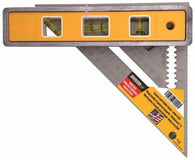Levels |Construction and Carpenters Levels
Whether you are building something for your home, surveying the land, or working on a major construction project, you need a tool to make sure your measurements are level and plumb so that your project works well and looks good. With so many choices of levels, which one do you choose?
This tutorial will provide some basics on the various types of levels available:
Bubble Levels (Spirit Levels):
A bubble level is a tool used to indicate how parallel (level) or perpendicular (plumb) a surface is relative to the earth. The level is placed against an object and the bubble markers show if the object is level or offset. The spirit level gets its name from the mineral spirit solution inside the levels. Most spirit levels have an I-Beam style structure and have a small barrel like tube towards each end of the tool. These tubes are filled with a liquid and have a single bubble inside, markings on the outside show if the bubble is "level". Things to look for in a good spirit level include what the level is made of. Machined aluminum and hardwood levels are generally more accurate and can handle harsh work environments.
Box Levels:
A box level works on the same principle as a spirit level but uses glass boxes to hold the bubble instead of a barrel shaped tube.
Torpedo Levels:
A torpedo level is generally smaller in size (between 6-12 inches) and is used to measure tight spaces that a regular level will not fit. Some torpedo levels are magnetic allowing you to measure tight spaces on metal surfaces without the level slipping or falling.
Laser Levels:
These levels use a laser to measure the level and plumb of a surface and additionally provide a visual laser dot on the actual surface for the user to plot or mark. We offer a wide range of laser levels and explain the differences between them below. Note that many of these laser levels are application specific. The three basic types of laser levels are 1) Plumb or dot lasers 2) Line level or line generators and 3) Rotary lasers
Plumb or Dot lasers:
These levels produce single or multiple visual dots on a surface providing a reference point that can be marked with a pencil or marker. Smaller versions of these are great for interior use from hanging pictures to leveling cabinets.
Line Level lasers or Line Generators:
These levels emit a level line onto a floor or wall rather than single or multiple points. These types of lasers are common for home use as they are smaller and more portable.
Rotary Level Lasers:
The final type of laser level is a rotary laser which will emit a level line but in a 360-degree pattern or the entire surface of a room. Rotary lasers are very accurate and usually require a tripod mount for proper use. The laser actually rotates within the housing thus emitting a 360-degree line around a room. If you use a rotary laser outdoors, you may require a laser detector in order to read the laser line.
Features to Look for in a Laser Level
Manual Leveling Lasers:
These levels must be leveled by the user adjusting thumb screws to get the unit leveled looking at the bubble vials.
Self-Leveling or Automatic Leveling Lasers:
These levels automatically determine and maintain the level of the user. Some units may require the user to "rough level" the unit first and then the lasers can more accurately bring itself into alignment. Most self-levers can maintain the level even if the platform or unit is bumped to ensure accuracy.
Split Beam or "Dual Beam" Laser Levels:
These levels need some clarification, a split beam produces a level laser line (the rotary laser) and a plumb laser dot or single point. These levels do not produce two rotary 360-degree lines level and plumb, just one rotary and one dot.
Laser Detectors:
A laser detector is a receiver mounted on a pole and used to detect the laser beam when measuring or surveying outdoors. The rotary laser sends out a laser in a 360-degree line from the unit and the detector must be set to receive it and thus determining the level of the area. Most detectors have an audible signal when the level is accurately captured.
Level Accessories:
Keep in mind that the majority of the levels we offer are used for commercial or industrial applications and are very accurate but also very sensitive. To ensure that these levels maintain their accuracy and to prevent damage we offer a wide assortment of cases and protective accessories. We also offer remote controls, battery packs and most everything you would need for a large range of applications.
We hope this information on levels was useful and helps you to determine which level meets your application needs. If you have additional questions please feel free to contact us and we will you help in selecting the correct level for your project.

